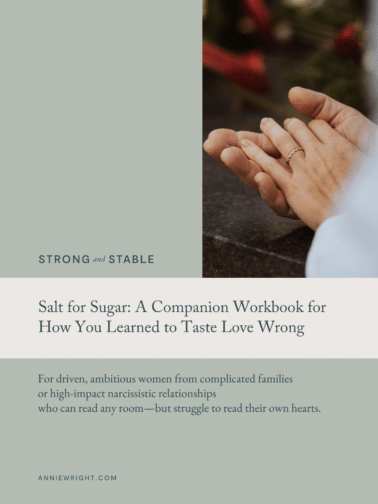“I don’t know what happened between you two but you NEED to forgive him!”
“You’ll feel so much better if ONLY you can find forgiveness in your heart.”
“The Bible teaches us we need to forgive. Why can’t YOU do that with her?”
“Don’t you WANT to forgive and forget? It will make you the bigger person.”
Does any of this sound familiar? Have you ever been at the receiving end of comments like this? Or maybe have you ever told anyone else something to this effect? If so, today’s blog post is for you.
You see, in my work as a psychotherapist and as a fellow human doing this whole life thing, there’s a subtle but pervasive pattern I see that happens in families and social groups all too often: forcing or shaming or blaming someone else into forgiveness before they feel truly ready to forgive.
I call this Forgiveness Shaming and Blaming and I think we need to talk about it.
Today I want to share with you what I think Forgiveness Shaming and Blaming is, how this happens, why this can be destructive, and why you actually don’t “need” or “have to” forgive anyone or anything if you truly don’t want or feel ready to.
What exactly *is* Forgiveness Shaming and Blaming?
Forgiveness Shaming and Blaming can look like any message you receive from someone that explicitly or implicitly asks or insists that you abandon your experience and act in a way that they find more preferable — in this case, practicing forgiveness when you don’t really feel ready or want to.
(The statements in this blog post’s intro are good examples of it.)
Forgiveness blaming and shaming can be subtle or overt and it can often be hard to see, particularly if you’re part of a family, community, religious group, or any other collective that all buys into the same belief: that you should forgive someone.
But why is this such a bad thing? Isn’t forgiveness a good thing?
Please understand I’m not at all devaluing forgiveness. I think forgiveness can be a beautiful process that can have a multitude of physiological and psychological benefits for the person who is self-directedly working towards and practicing it.
What I find troubling is when individuals, families, or groups send the message to a person who has suffered that they should or have to experience forgiveness before they’ve fully worked through all of the painful feelings of the event or events that may have happened to them.
In these cases, asking/insisting that someone forgive before or even if they genuinely want and feel capable of doing so sends a message to those who’ve been hurt that they should, essentially, self-abandon and feel something other than what they genuinely feel. And this — pressure to self-abandon by rushing to forgiveness — is usually the very last thing victims of abuse, trauma, or painful life circumstances need.
The reality is that forgiveness often requires a deep process of grieving and healing that looks and feels different for everyone. There is no prescribed timeframe, no generalized benchmark for the forgiveness process. It takes as long as it takes. And what’s more, some people may never get to the point where they feel like they can or want to forgive someone who has hurt them. And that’s okay, too.
But when individuals, families or groups send the message that forgiveness is the end goal and something someone should or must do, it can, in my opinion, often be detrimental and further emotionally damaging to people in pain.
Why do people shame and blame others into forgiveness?
In my experience as a psychotherapist, the reasons why some individuals, families, and groups shame or blame others into forgiveness are complex and varied.
- Perhaps it’s about “keeping the family together.” After all it’s hard to pretend things are hunky dory when there’s a member of the family angry and hurting about the abuse he suffered at the hands of another family member…
- Perhaps it’s because the person saying you “need” or “have to” forgive received those very same messages from her parents. Maybe this is all she knows to be true and is now projecting that belief onto you…
- Perhaps it’s about a group staying comfortable. If victims step forward, speak out, and aren’t “forgiving” their abusers, institutions and groups may have to do the very hard work of self-reflection and systems change that led to the victimization in the first place…
- Perhaps it’s hard and triggering for the other person to see you have your feelings of anger, grief, hurt. What does it bring up for them that you’re having these feelings and not willing/ready/able to forgive? What’s so intolerable about your feelings for them?
There are a multitude of reasons why people may subtly or overtly, conscious or unconsciously shame or blame others into forgiveness and while it can be helpful to explore this, I think it’s far more important for you to be able to recognize when you’re personally being shamed, blamed or forced into forgiveness so that you can hold your boundaries, trust your own process, and heal according to your own timeline.
So what can I do when someone starts to shame or blame me into forgiveness?
I think the most important thing you can “do” when someone starts to subtly shame or blame you into forgiveness is to remember this:
You have a right to feel your feelings. All of them. You have a right to not forgive someone or something that’s hurt you. Whatever you feel about that right now is okay. Your healing process is your own and you don’t have to be anywhere other than where you are. You are not responsible for making anyone else feel comfortable by feeling something other than what you feel. You get to have your experience.
The more you can check in with yourself, trust and honor your own process, and allow yourself to believe that you get to have your experience, the more empowered you may be to 1) recognize when your experience or boundaries are being dismissed or crossed and 2) advocate or educate the other person about this if that’s what you need/want.
You know, in my experience, most people aren’t consciously or maliciously intending to shame or blame others into forgiveness. They simply don’t know what they don’t know and, in many cases, simply perpetuate the messages and beliefs that they themselves have received.
Finally, I want you to remember this: Even if you reach a place of forgiveness with someone, that doesn’t mean you have to allow them into your life. And what’s more, if you never reach a place of forgiveness with someone or something, that’s okay, too.
Now I’d love to hear from you in the comments below:
Have you ever experienced being shamed or blamed into forgiveness? How did you handle that? What messages or beliefs have you received about forgiveness from your own family and communities?
Leave me a message in the comments below and I’ll be sure to respond.
Here’s to healing relational trauma and creating thriving lives on solid foundations.
Warmly,
Annie





